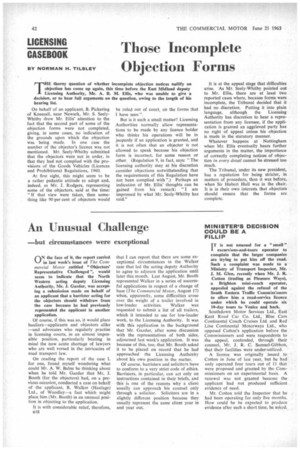Those Incomplete Objection Forms
Page 44

If you've noticed an error in this article please click here to report it so we can fix it.
BY NORMAN H. TILSLEY
THE thorny question of whether incomplete objection notices nullify an objection has come up again, this time before the East Midland deputy Licensing Authority, Mr. A. R. M. Ellis, who was unable to give a decision, or to hear full arguments on the question, owing to the length of his hearing list.
On behalf of an applicant, B. Pickering of Kneesall, near Newark, Mr. S. SeelyWhitby drew Mr. Ellis' attention to the fact that the second part of some of the objection forms were not completed, giving, in some cases, no indication of the grounds upon which the objection was being made. In one case the number of the objector's licence was not mentioned. Mr. Seely-Whitby submitted that the objectors were not in order, in that they had not complied with the provisions of the Goods Vehicles (Licences and Prohibitions) Regulations, 1960.
At first sight, this might seem to be a rather pedantic attitude to adopt and, indeed, as Mr. L Rodgers, representing some of the objectors, said at the time: "If that view were taken, then something like 90 per cent of objectors would be ruled out of court, on the forms that I have seen ".
But is it such a small matter? Licensing Authorities normally allow representations to be made by any licence holder who thinks his operations will be in jeopardy if an application is granted, and it is not often that an objector is not allowed to speak because his objection form is incorrect, for some reason or other. (Regulation 9, in fact, says: "The licensing authority may at his discretion consider objections notwithstanding that the requirements of this Regulation have not been complied with ".) Perhaps an indication of Mr. Ellis' thoughts can be gained from his • remark: I am impressed by what Mr. Seely-Whitby has said." It is at the appeal stage that difficulties arise. As Mr. Seely-Whitby pointed out to Mr. Ellis, there are at least two reported cases where, because forms were incomplete, the Tribunal decided that it had no discretion. Putting it into plain language, although the Licensing Authority has discretion to hear a representation from any licensee, if the application is granted an aggrieved party has no right of appeal unless his objection is made in the statutory manner.
Whatever happens at Nottingham when Mr. Ellis eventually hears further arguments in the matter, the importance of correctly completing notices of objection in every detail cannot be stressed too much.
The Tribunal, under its new president, has a reputation for being stricter, in matters of procedure, than it was before, when Sir Hubert Hull was in the chair. It is in their own interests that objectors should ensure that the forms are complete.




















































































































